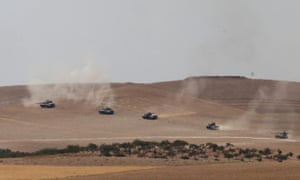The Guardian
Link
Turkey has launched a major military intervention in Syria, sending tanks and warplanes across the border in a coordinated campaign with Syrian opposition fighters, who seized an Islamic State-held village in the area in the first hours of fighting.
The operation, called Euphrates Shield, has a dual purpose: to dislodge Isis from Jarablus, its last major redoubt on the 500-mile border, and to contain the expansion of Kurdish militias in northern Syria.
Turkish tanks crossed the Syrian border as artillery and fighter jets pounded the militants in an operation backed by the US-led coalition. The incursion also opened corridors for Syrian opposition fighters backed by Turkey, who mounted an assault in the area.
Syrian rebels clashing with Isis fighters seized Kaklijah, Turkish military sources said. There were no immediate details about casualty figures.
The Syrian Observatory for Human Rights, a monitoring group, said violent clashes were taking place between Turkish-backed opposition fighters and Isis in the area surrounding Jarablus.
“We are determined to clear Daesh [Isis] from the border,” said the foreign minister Mevlüt Çavuşoğlu, at a press conference on Wednesday.
The operation marks the first time Ankara’s ground forces have ventured into Syria, with the exception of a brief operation early last year to rescue the tomb of an ancestor of the founder of the Ottoman empire.
Turkey said it had hit 81 targets in northern Syria with F-16 warplanes and had also shelled Isis positions.
“At 4am this morning, operations started in the north of Syria against terror groups which constantly threaten our country,” Turkey’s president, Recep Tayyip Erdoğan, said in a speech in Ankara, adding that the operation would target both Isis and Kurdish militants.
The government in Ankara said the operation was an act of self-defence, in response to Isis shelling of Turkish border towns and suicide bombings and attacks targeting Turkish nationals. The bombing of a wedding in Gaziantep over the weekend killed more than 50 people, many of them children, and Isis-linked militants have carried out attacks in Ankara and Istanbul, including one at Atatürk airport.
It also billed it as an operation that would stem the flow of foreign fighters, who make up a significant contingent of Isis, to Syria, and the flight of refugees from the war-torn country.
“The operation comes in response to terrorist attacks on Turkish soil and artillery fire by Daesh militants in Syria on targets inside Turkey,” the state-run Anadolu news agency said. “The operation is in line with the country’s rights to self-defence borne out of international treaties and a mandate given to the armed forces by the Turkish parliament.”
The interior minister, Efkan Ala, said the response was Turkey’s “most legitimate right” and that his country could not be a “mere spectator” amid the intensifying threat by Isis.
The airstrikes were the first by Turkey, a Nato member, in Syria since November, when its fighter jets shot down a Russian warplane that had strayed into Turkish airspace, leading to a collapse of relations with Moscow that lasted until a rapprochement in July. Last week, the Turkish prime minister, Binali Yıldırım, said his country would take a more “active” role in the war in Syria, which has driven more than 2 million refugees into Turkey.
The US vice-president, Joe Biden, was due to arrive in Ankara on Wednesday morning, hours after the launch of the operation. Relations between the two allies have been strained since an attempted coup last month that aimed to overthrow Erdoğan, who accuses a US-based cleric, Fethullah Gülen, of masterminding the plot and is seek ing his extradition.
Relations have also deteriorated over American backing of the Kurdish People’s Protection Units (YPG), which has expanded its sphere of influence in northern Syria as it conquered vast tracks of land from Isis with the backing of American air power. Ankara considers the YPG as the Syrian arm of the Kurdistan Workers party (PKK), which is fighting an insurgency against the government and is a designated terrorist group, and considers Kurdish expansionism on its border a threat to national security.
If rebel forces backed by Turkey take control of Jarablus, they would limit the westward expansion of the Kurdish autonomous zone, which Ankara also says poses a threat to Syria’s territorial integrity.
Turkey’s latest campaign is a development that underscores both the complexity and the stakes involved in Syria’s war, which has drawn in the region’s powers, laid much of the country to waste and forced a reshifting of longstanding alliances. While defeating Isis has long been the paramount American obsession in Syria, Turkey sees the departure of its president, Bashar al-Assad, as a necessary condition for peace talks, and rejects the idea of a Kurdish statelet on its borders.



No comments:
Post a Comment